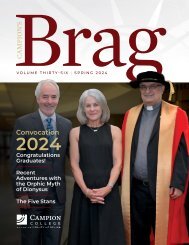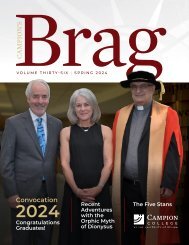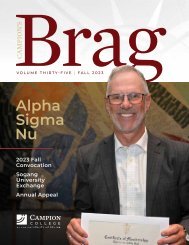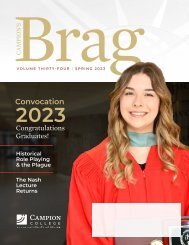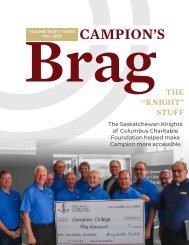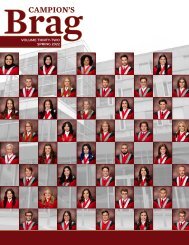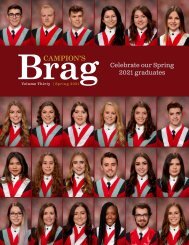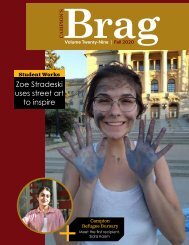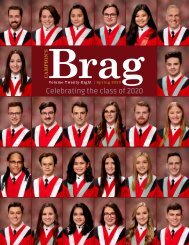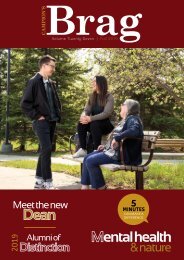Brag Fall 2021
You also want an ePaper? Increase the reach of your titles
YUMPU automatically turns print PDFs into web optimized ePapers that Google loves.
This started off as a Friday afternoon talk<br />
(with snacks) in the Campion “Idle Talk”<br />
series of faculty lectures. The subject was<br />
music and song references in George Orwell’s<br />
Nineteen Eighty-Four and it seemed to be well<br />
received. When I took the talk to the University<br />
of Saskatchewan (as part of the annual<br />
exchange of speakers between the English<br />
departments) I added in Aldous Huxley’s Brave<br />
New World. For both talks, I brought along my<br />
keyboard and offered demonstrations of some<br />
of the pieces.<br />
The musical references in Brave New World and<br />
Nineteen Eighty-Four are primarily to popular<br />
songs of the 1920s and 1940s.<br />
Huxley underscored the emotional shallowness<br />
of popular music, represented by such<br />
immortal songs as “Hug Me Till You Drug Me,<br />
Honey.” Brave New World’s scorn for popular<br />
music ― and for popular culture in general ―<br />
situates Huxley’s famous dystopia as a “High<br />
Modernist” work.<br />
In Orwell’s case, implicit references to World<br />
War II hits such as “We’ll Meet Again” and “I’ll<br />
Be Seeing You” reflect ironically upon the<br />
relationship of Winston and Julia and their<br />
terrible situation at the end of the novel.<br />
Orwell’s treatment of the musical thrush and<br />
the singing Prole laundrywoman plays a more<br />
hopeful note, and shows a more positive<br />
attitude to popular songs and popular culture,<br />
which situates Nineteen Eighty-Four on the<br />
cusp of “Post-Modernism.”<br />
There has been considerable scholarly<br />
discussion about hope and despair in<br />
these famous dystopian novels. The signs of<br />
hopefulness in Brave New World are very<br />
slight, although they do exist. However, music<br />
references in Nineteen Eighty-Four lend some<br />
support to the view that Orwell’s novel is not<br />
quite so despairing as it is sometimes made out<br />
to be.<br />
Scholarly projects often turn up interesting<br />
details along the way. One detail about Brave<br />
New World that I had never really considered<br />
has to do with the lighthouse to which John<br />
escapes at the end of the novel. I assumed, in<br />
my geographical ignorance, that this was a<br />
lighthouse on the seacoast somewhere. When<br />
I realized that Surrey is a county near London<br />
which has no seacoast, it became clear this<br />
was an inland lighthouse. Huxley’s childhood<br />
home was near an abandoned Victorian<br />
semaphore tower and his imagination<br />
converted this into a lighthouse for the<br />
guidance of the brave new world’s helicopter<br />
pilots.<br />
Another curious detail arose from Orwell’s<br />
allusion to a popular novelty song of 1939:<br />
“Under the Spreading Chestnut Tree.” It is a<br />
sentimental love song based on a poem by<br />
Longfellow, and Orwell used it ironically as the<br />
name for the “Chestnut Tree Café” in the novel,<br />
associated with the fact that Winston and Julia<br />
have betrayed each other. The sheet music<br />
also contains drawings of stick-figures above<br />
the notes, showing how to do the dance steps<br />
to the song.<br />
Scholarship since the 1960s has paid<br />
considerable attention to the cultural contexts<br />
of literature, including songs and the internet<br />
makes it relatively easy to access song allusions.<br />
For example, Orwell’s ironic allusion of “We’ll<br />
Meet Again” becomes even more meaningful<br />
when we see and hear Vera Lynn performing<br />
the song for hundreds of troops about to ship<br />
off to war.<br />
Consider adding some music to your reading -<br />
it may make the words come alive!<br />
LEARN<br />
MORE<br />
You can read Dr.<br />
MacDonald’s article<br />
in the University of<br />
Toronto Quarterly,<br />
Volume 90, Issue 1:<br />
15




